Mumbai, the city of dreams, is home to people from all over India who come here for opportunities. Its landscape is a mix of towering buildings and informal settlements, having its own stories. Inspired by this, YUVA started ComplexCity — a festival that moves through different spaces in Mumbai, from bastis and college classrooms to amphitheatres and auditoriums. The festival brings people together for open conversations, reflections, and collective efforts towards building a better and more sustainable city.
As part of ComplexCity 7.0, we organised a street play competition that became a platform for young voices to challenge silence and stigma around important social issues. This year, the focus was on mental health and well-being. Through ComplexCity street play competitions, participants engaged in constructive reflection and dialogue on the urban and better understood their city through their efforts and each other’s perspectives.
Six teams from different communities across Mumbai participated, showcasing their efforts after days of practice. With powerful voices, expressive body movements, and eyes filled with emotions, they set out to break the silence around mental health, turning the street into a space for awareness and dialogue. Each performance explored different topics of mental health issues.
The evening opened with a familiar yet thought-provoking phrase: “Tu mental hai kya?”—a question often thrown around casually, without considering how it adds to the stigma. What seemed like a simple remark quickly set the stage for a deeper conversation on mental well-being.
Archana Pandit, an esteemed psychologist and one of the judges, shared, “Understanding the human mind is not just about science; it’s about empathy and connection.” Our second judge, Sandesh Gaikwad, an artist and director, reflected, “Art has the power to mirror society and spark meaningful conversations.” Their insights added depth and perspective to the event.
The opening performance by the Malwani YUVA Parishad (MYP) youth collective showed the overwhelming weight of academic pressure that students often face, a theme that resonated deeply with the audience. Through their play, they highlighted the frustration many students feel when parents compare their struggles to the past, often saying things like, “In our time, we didn’t have the facilities that this generation has,” which demonstrated the generational gap.
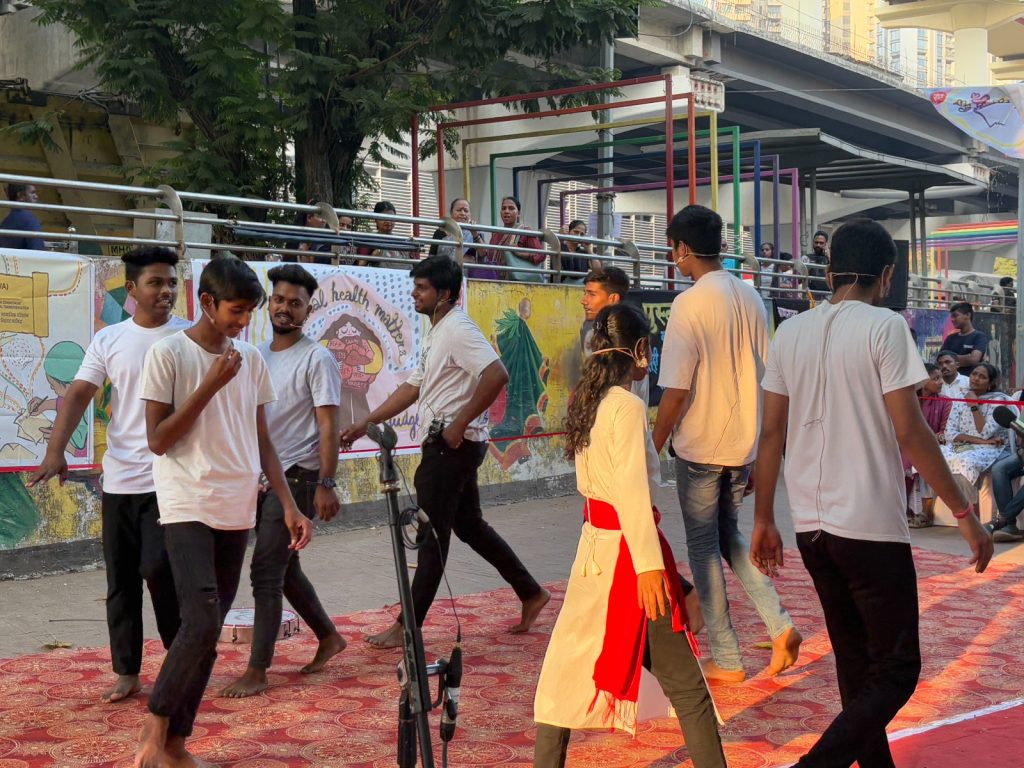
The play addressed the impact of societal pressures on mental health, shedding light on the silent battles individuals face, including the struggle with suicidal thoughts. The portrayal was heartfelt. Despite the heavy themes, the performance ended on a hopeful note and a powerful message: “All is well” It served as a gentle reminder that even in the toughest times, there’s always a way forward and a chance to rediscover hope and happiness.
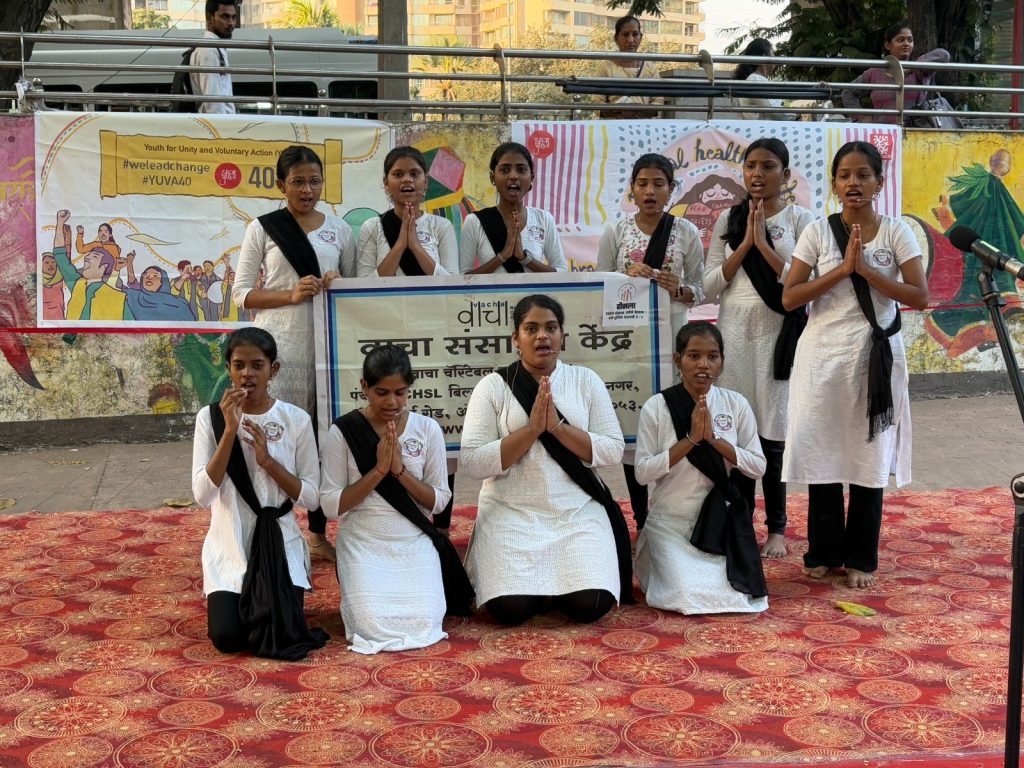
The Hausla team from Vacha Trust brought attention to the everyday struggles of domestic workers, emphasising issues like sexual harassment, alcoholism, and unemployment. One scene portrayed a domestic worker facing harassment from her employer, while another depicted a man coping with family pressure by turning to alcohol. The performance was raw and relatable, bringing attention to important but often overlooked realities.
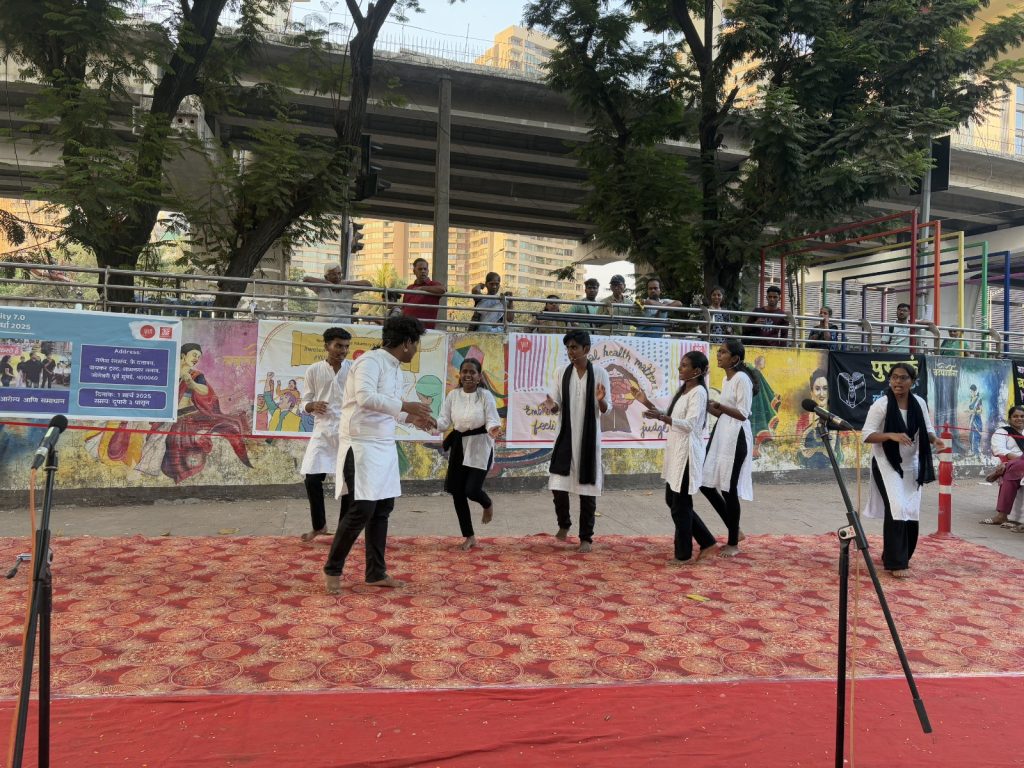
Kirti Katta’s performance spotlighted the impact of social media on mental health, showing how words can leave lasting effects on one’s mind. One particularly striking scene depicted cyberbullying, where a young woman scrolled through negative comments online, which deeply affected her because of society’s judgments. Anubhav Siksha Kendra (ASK) highlighted the generational gap between children and parents in understanding mental health through simple yet impactful scenes. In one moment, a father proudly says, “Sher hai mera beta!” (My son is a lion), completely unaware of the struggles his son faces daily. The unspoken expectations felt heavy and real. Another scene showed a young child witnessing domestic violence, a moment during the play that showcased how disturbing it can be for a child.
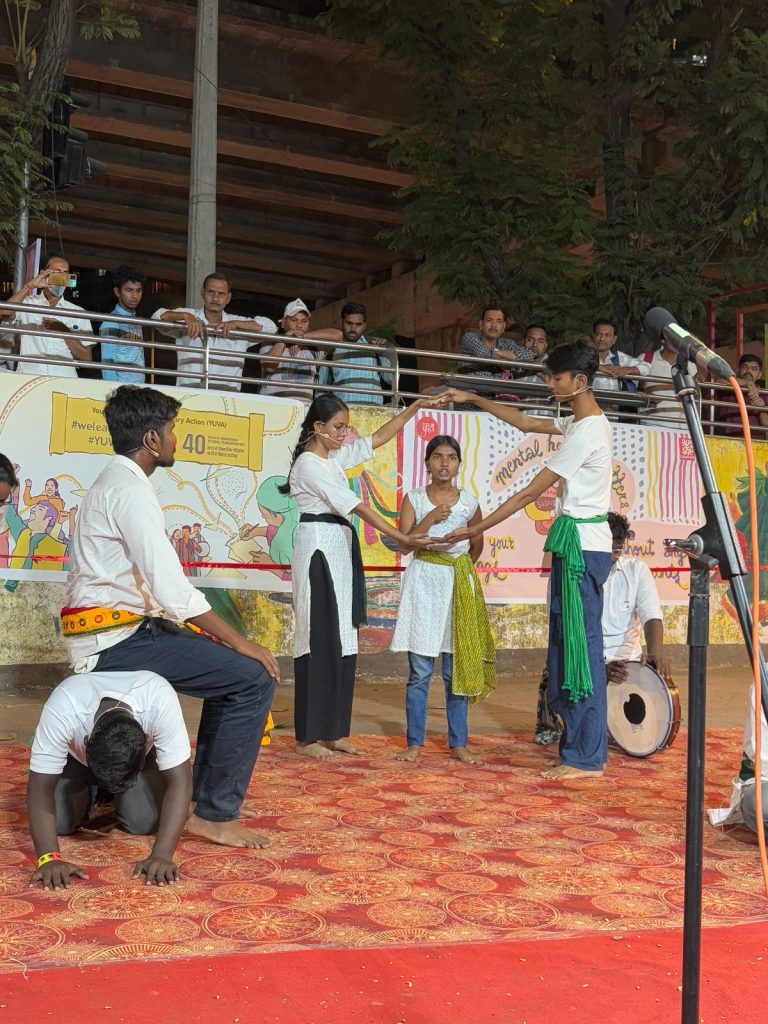
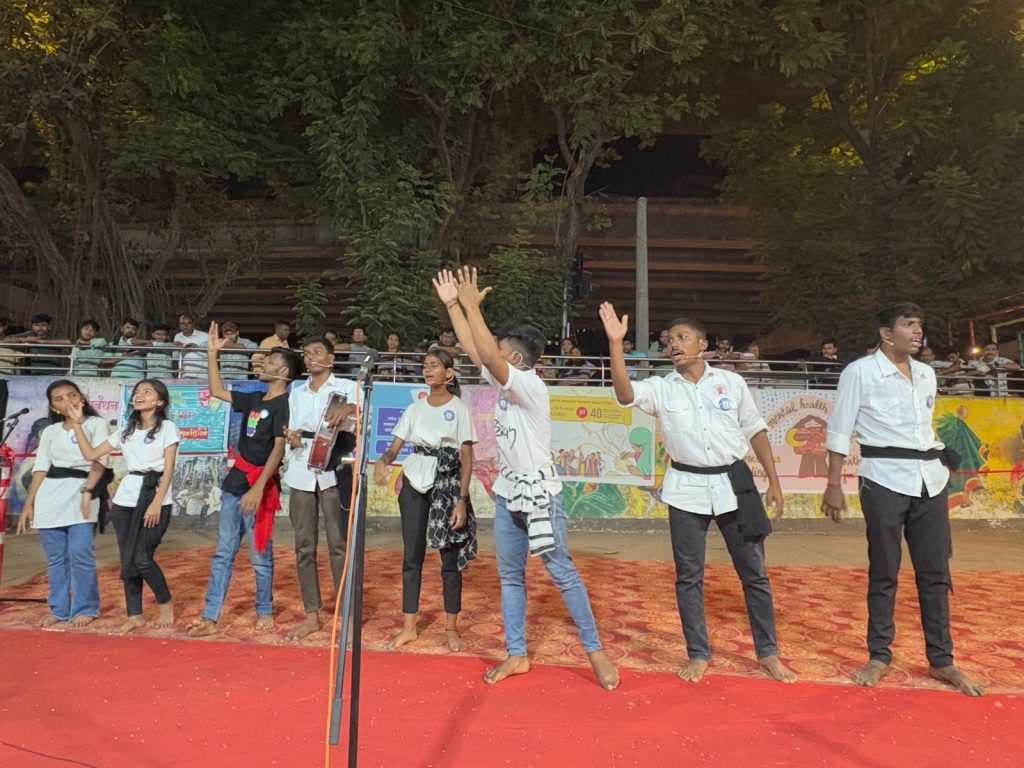
Bal Adhikar Sangharsh Sangathan (BASS) wrapped up their performances in a way that mixed humour with a strong social message, creating an environment that was both entertaining and enlightening.
One of the most important takes was on a superstitious healer who claimed to have magical potions to cure everything, including mental health issues. His funny dialogues had the audience laughing, but beneath the humour was a serious message. Mental health isn’t something that can be fixed with quick remedies, it needs empathy, support, and understanding.
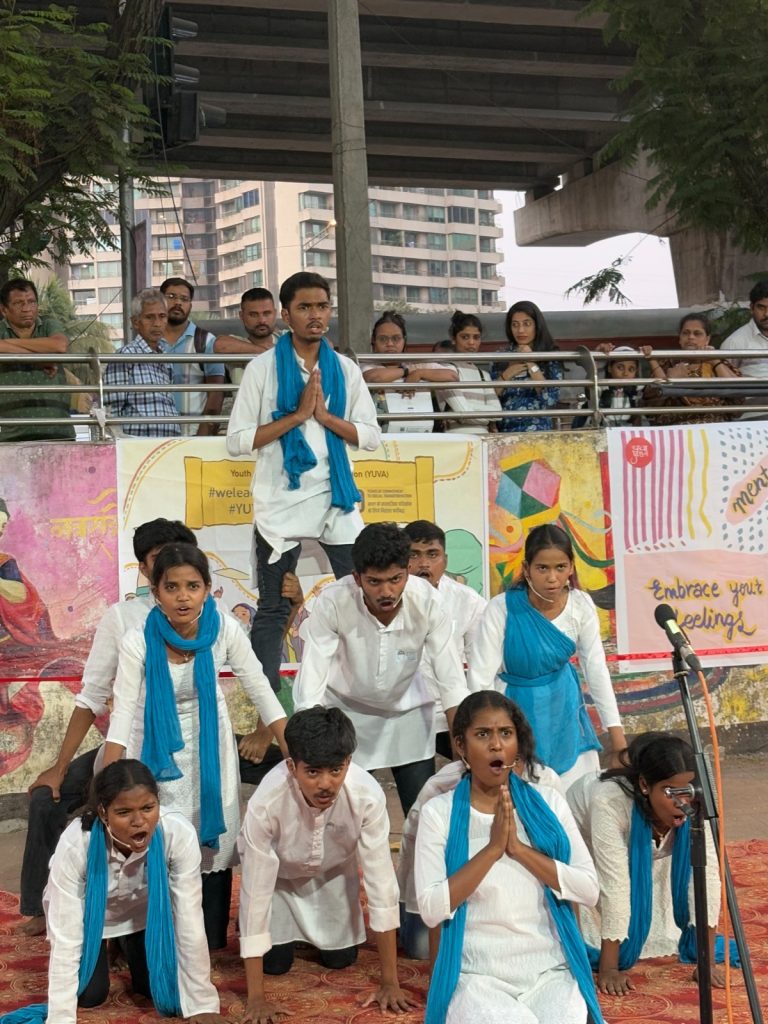
Atmashakti, who bagged the first place, uncovered the deep impact of patriarchy on mental health through an impactful story. The play follows a young boy crushed under the weight of societal expectations. He struggles with the harsh realities of college life, facing relentless ragging from his peers, while also dealing with pressure at home to live up to traditional ideas of masculinity.
One particularly moving scene showed the boy’s breaking point, leading to suicide. The participants conveyed this moment with quiet intensity, a simple yet powerful visual that left the audience in stunned silence. The scene stayed with everyone, reflecting on the silent struggles many face under such pressures.
Watch the highlights of the street play here:
Judges Archana Pandit and Sandesh Gaikwad reflected on the performances with their thoughts. Archana applauded the participants for their art and encouraged them to research more on such a vast topic, and mentioned that “Mental health issues affect everyone, regardless of their background.”
Sandesh shared his belief in the impact of street plays in our fast-paced lives. “In a world of two-minute reels, street plays can be a powerful way to raise awareness,” he said.
Sachin Nachnekar from YUVA shared, “Art is one of the most effective ways to reach people. Street plays don’t require a stage or expensive resources—they can be organised anywhere, allowing awareness to spread naturally. Mental health is just as important as physical health, yet it is often overlooked. Through these plays, we’re encouraging people to speak up and seek help.”
Adding to this, Vijay Kharat from YUVA reflected on the broader impact of ComplexCity: “For seven years, the festival has brought communities together for meaningful conversations. Mental health issues are often misunderstood or ignored, and through initiatives like curated walks, literature, and street plays, we create space for open dialogue.”
Voices from the audience
A young man who had paused to watch the performances said, “I was just passing by, but something about these plays made me stop. Mental health isn’t always easy to talk about, and it’s good to see our generation bringing these conversations into the open.”
An elderly woman enjoying the plays said, “When I was younger, no one spoke about these things. If someone was struggling, they were just told to be strong and move on. It’s good to see young people creating awareness—maybe it will help others open up.”
A college student, who was also a participant there, shared, “I’ve seen friends go through tough times but hesitate to ask for help. Being a part of this street play competition, I realised how important it is to listen, to check in on people, and to talk about mental health without shame.”
As we reflected on this impactful evening, we carried the spirit with us. Each story shared and every performance witnessed reminded us that our voices have power and that we are not alone in our struggles.
The performances reflected the silent struggles people face in a fast-paced world, emphasising the need to break the stigma around mental health. Conversations about mental well-being shouldn’t be taboo, they need to be heard. At YUVA, we believe in the power of storytelling through art, helping people connect and reflect. Let’s continue sharing our stories, amplifying our voices, and building a more understanding and supportive community.


